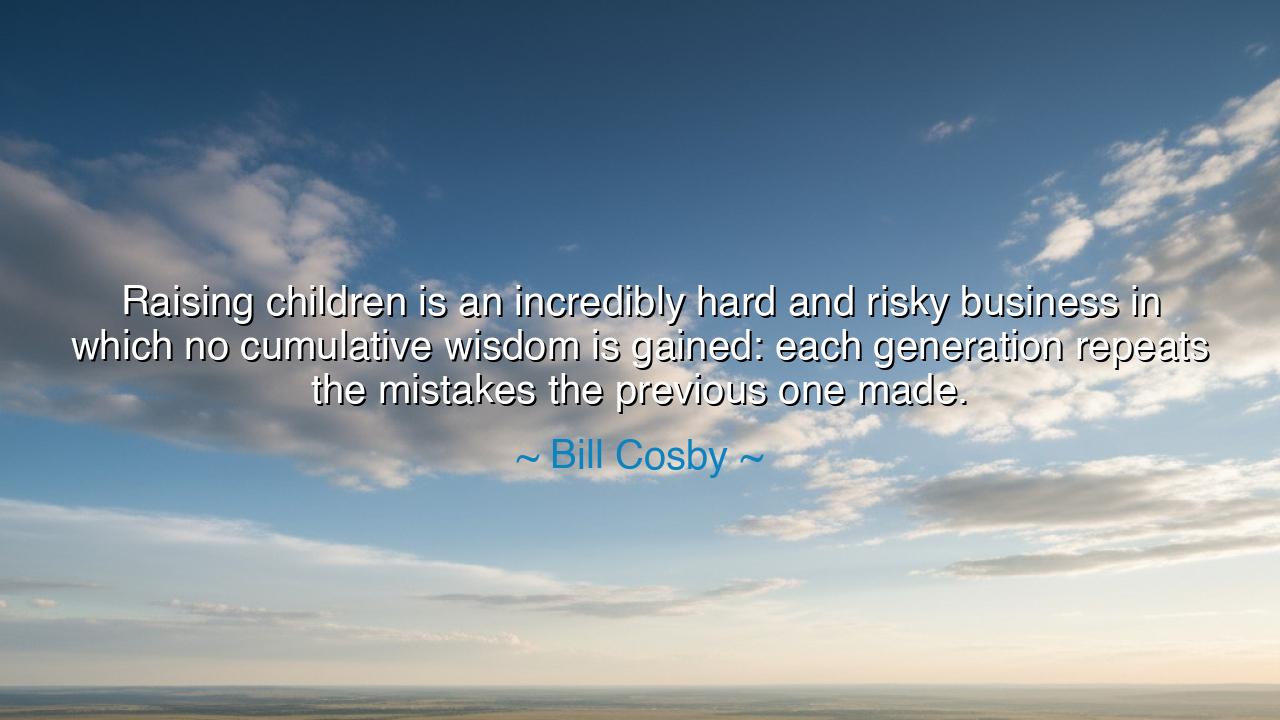
Raising children is an incredibly hard and risky business in
Raising children is an incredibly hard and risky business in which no cumulative wisdom is gained: each generation repeats the mistakes the previous one made.






Hearken, children of ages yet to dawn, to the sober words of Bill Cosby, who observed: “Raising children is an incredibly hard and risky business in which no cumulative wisdom is gained: each generation repeats the mistakes the previous one made.” In this utterance lies the eternal truth of parenting, risk, and the cycles of human folly. The task of guiding young souls is fraught with uncertainty, for the lessons of the past do not always pass unscathed to the next generation; each child must traverse the path anew, and each parent must grapple with challenges untold.
Cosby teaches that experience, though valuable, is not wholly transferrable. No matter the accumulated wisdom of elders, each generation confronts its own trials, faces its own temptations, and repeats the missteps of those who came before. The mistakes are woven into the human condition, reminders of the limits of foresight, and the persistent necessity of vigilance, patience, and love. Here lies the paradox: wisdom is both inherited and re-earned with each new life.
Consider the tale of King Lear, whose blindness to the hearts of his daughters wrought ruin upon his family and kingdom. The tragedy recurred across the generations, mirrored in the follies of Lear’s offspring and the havoc of ambition unchecked. Even the greatest wisdom of the king could not shield his progeny from repeating the errors of judgment, pride, and miscommunication. In this, Cosby’s reflection finds resonance: the raising of children is perilous, and experience alone cannot guarantee success.
Yet within this sobering truth lies also counsel and hope. Each parent, though they cannot prevent all missteps, can offer guidance, love, and discipline, cultivating the soil from which resilience and understanding may grow. Though mistakes may be repeated, the effort to teach, nurture, and shape character is itself a noble endeavor. The ancients recognized the fragility and valor of parenting, portraying it as both duty and sacred trial, a crucible in which human character is forged anew with each generation.
Thus, the words of Cosby serve as both warning and encouragement: to raise children is to accept the risk inherent in life, to labor without guarantee, and to confront the recurrence of human error. The parent’s reward is not the elimination of mistakes, but the cultivation of hearts capable of striving toward virtue, courage, and understanding, even amidst imperfection.
Carry this teaching, children of ages yet unborn: embrace the challenge of raising children with patience, wisdom, and humility, knowing that the cycles of error are part of the human journey. Each generation repeats, yet each generation also learns, and through this eternal striving, the flame of human virtue endures, flickering yet persistent across the endless march of time.






HQVan Huu Quan
I see a deep truth in this sentiment, though it feels a bit fatalistic. Each generation of parents seems to believe they’re doing things differently, yet children still grow up facing similar struggles. Maybe wisdom in parenting can’t accumulate because it’s bound to context—society, technology, and values keep evolving. Does that mean parenting will always be a trial-and-error process? Or could collective learning someday help parents truly transcend past mistakes?
ANLan Anh Ngoc
This idea makes me think about generational patterns—how families often repeat emotional dynamics or mistakes despite their best efforts. Maybe the issue isn’t about knowledge but emotional inheritance. Could it be that understanding doesn’t translate into change because behavior is so deeply ingrained? I’m curious how self-awareness or therapy might break that cycle. Can modern parenting truly escape the unconscious repetition of past generations, or are we all destined to repeat?
MHNguyen manh Hung
Reading this, I feel a bit uneasy. If no cumulative wisdom is gained, does that mean parenting advice books and experts are all futile? Maybe the problem isn’t that we don’t learn, but that every child is so unique that general wisdom can’t fully apply. I’d love to hear whether others believe parenting is more an art than a science, something that can only be lived through, not taught or passed down.
KLKha Le
I find this observation cynical but thought-provoking. It makes me question whether human nature itself prevents us from learning effectively about parenting. Maybe emotions like love, fear, and pride override logic, causing us to repeat mistakes. Yet, I also see progress—parents today are more aware of mental health, empathy, and communication. So, can we truly say no wisdom accumulates, or is the learning just slower and less visible than we’d like?
TPPhan The phong
This statement hits hard because it feels both true and discouraging. Parenting does seem like an endless cycle where we try to do better but often fall into the same traps. Is it really impossible to learn from past generations? Or do cultural shifts make each era so unique that every set of parents must start from scratch? I wonder whether technology and shared experiences online have changed that dynamic at all.